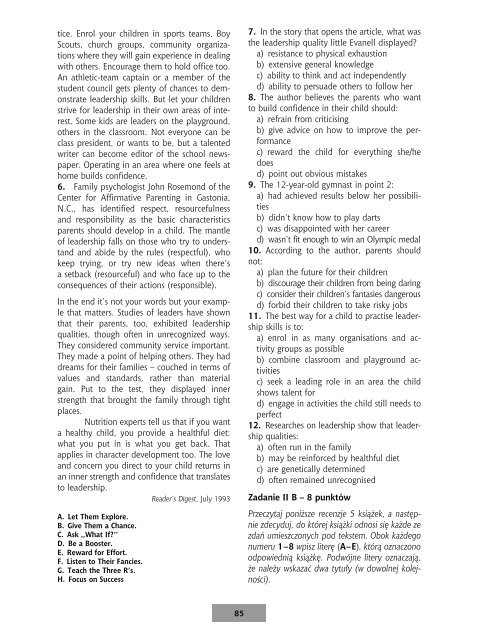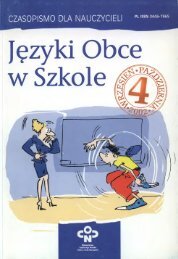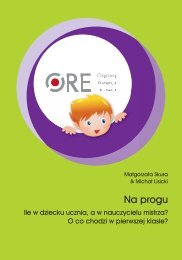PrzeglÄ daj publikacjÄ
PrzeglÄ daj publikacjÄ
PrzeglÄ daj publikacjÄ
Create successful ePaper yourself
Turn your PDF publications into a flip-book with our unique Google optimized e-Paper software.
tice. Enrol your children in sports teams, Boy<br />
Scouts, church groups, community organizations<br />
where they will gain experience in dealing<br />
with others. Encourage them to hold office too.<br />
An athletic-team captain or a member of the<br />
student council gets plenty of chances to demonstrate<br />
leadership skills. But let your children<br />
strive for leadership in their own areas of interest.<br />
Some kids are leaders on the playground,<br />
others in the classroom. Not everyone can be<br />
class president, or wants to be, but a talented<br />
writer can become editor of the school newspaper.<br />
Operating in an area where one feels at<br />
home builds confidence.<br />
6. Family psychologist John Rosemond of the<br />
Center for Affirmative Parenting in Gastonia,<br />
N.C., has identified respect, resourcefulness<br />
and responsibility as the basic characteristics<br />
parents should develop in a child. The mantle<br />
of leadership falls on those who try to understand<br />
and abide by the rules (respectful), who<br />
keep trying, or try new ideas when there’s<br />
a setback (resourceful) and who face up to the<br />
consequences of their actions (responsible).<br />
In the end it’s not your words but your example<br />
that matters. Studies of leaders have shown<br />
that their parents, too, exhibited leadership<br />
qualities, though often in unrecognized ways.<br />
They considered community service important.<br />
They made a point of helping others. They had<br />
dreams for their families – couched in terms of<br />
values and standards, rather than material<br />
gain. Put to the test, they displayed inner<br />
strength that brought the family through tight<br />
places.<br />
Nutrition experts tell us that if you want<br />
a healthy child, you provide a healthful diet:<br />
what you put in is what you get back. That<br />
applies in character development too. The love<br />
and concern you direct to your child returns in<br />
an inner strength and confidence that translates<br />
to leadership.<br />
Reader’s Digest, July 1993<br />
A. Let Them Explore.<br />
B. Give Them a Chance.<br />
C. Ask ,,What If?’’<br />
D. Be a Booster.<br />
E. Reward for Effort.<br />
F. Listen to Their Fancies.<br />
G. Teach the Three R’s.<br />
H. Focus on Success<br />
7. In the story that opens the article, what was<br />
the leadership quality little Evanell displayed?<br />
a) resistance to physical exhaustion<br />
b) extensive general knowledge<br />
c) ability to think and act independently<br />
d) ability to persuade others to follow her<br />
8. The author believes the parents who want<br />
to build confidence in their child should:<br />
a) refrain from criticising<br />
b) give advice on how to improve the performance<br />
c) reward the child for everything she/he<br />
does<br />
d) point out obvious mistakes<br />
9. The 12-year-old gymnast in point 2:<br />
a) had achieved results below her possibilities<br />
b) didn’t know how to play darts<br />
c) was disappointed with her career<br />
d) wasn’t fit enough to win an Olympic medal<br />
10. According to the author, parents should<br />
not:<br />
a) plan the future for their children<br />
b) discourage their children from being daring<br />
c) consider their children’s fantasies dangerous<br />
d) forbid their children to take risky jobs<br />
11. The best way for a child to practise leadership<br />
skills is to:<br />
a) enrol in as many organisations and activity<br />
groups as possible<br />
b) combine classroom and playground activities<br />
c) seek a leading role in an area the child<br />
shows talent for<br />
d) engage in activities the child still needs to<br />
perfect<br />
12. Researches on leadership show that leadership<br />
qualities:<br />
a) often run in the family<br />
b) may be reinforced by healthful diet<br />
c) are genetically determined<br />
d) often remained unrecognised<br />
Zadanie II B – 8 punktów<br />
Przeczytaj poniższe recenzje 5 książek, a następnie<br />
zdecyduj, do której książki odnosi się każde ze<br />
zdań umieszczonych pod tekstem.Obok każdego<br />
numeru 1–8 wpisz literę (A–E), którą oznaczono<br />
odpowiednią książkę.Podwójne litery oznaczają,<br />
że należy wskazać dwa tytuły (w dowolnej kolejności).<br />
85
















